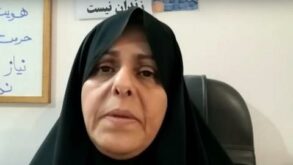Al-Monitor – Iran’s official nomination to the 90th Academy Awards in the best foreign language category is the country’s first ever nomination of a female director’s work. “Nafas,” or “Breath,” written and directed by Narges Abyar, examines a tumultuous time in Iran through the eyes of a little girl.
On Sept. 19, a jury composed of nine film professionals nominated the movie to represent Iran at the Oscars. Produced in 2015 and released in 2016, “Breath” combines animation and live action to depict the everyday life of a poor family living in Valadabad, a suburb of Karaj, during the 1979 Islamic Revolution and the 1980-88 Iran-Iraq War.
“Breath” is the story of a curious and imaginative Iranian girl named Bahar who lives in her own world of dreams and fantasies during a time that is filled with political and social turmoil. An avid reader and dreamer, Bahar dreams of becoming a “doctor of breath” so she can treat her father’s asthma. Then the war starts.
“I’m not too scared of Iraqi planes, because even if they bomb us and I die, I can be a shortness of breath doctor for the dead and treat their illnesses,” says Bahar as she along with her father, sister, two brothers and grandmother take shelter in a basement. In earlier scenes, Bahar innocently talks about some of the most important political-historical events that have happened in Iran in the past 40 years, including the overthrow of Iran’s former ruler Mohammad Reza Pahlavi, the return of Ayatollah Ruhollah Khomeini from exile, the 1979 Islamic Revolution and the start of the Iran-Iraq War.
According to Iranian film critic Reza Seddigh, “Breath” is a unique film in the style known as “sacred defense” cinema, which includes films about the Iran-Iraq War.
In an interview with Al-Monitor, Seddigh said, “The key point here is that through the film’s young narrator, the audience journeys into the innocence of childhood. Another point is the new format in which the film narrates the war. In ‘Breath’ we see the parallelism of the destruction of war and the shattered imaginary world of a little girl who is the film’s ‘superhero.’”
“Breath,” based on the novel by the same name by Abyar, was named best film with a “national view” at the 34th Fajr International Film Festival in 2016. Abyar’s other works in the sacred defense genre include “Trench 143,” a 2013 screen adaptation of her novel by the same name.
The first film Abyar directed, “Objects in Mirror Are Closer Than They Appear,” deals with social issues, particularly related to women. Commenting on why she produced works related to the Iran-Iraq War, Abyar told Al-Monitor, “For me, the war was a central issue, because part of my childhood and youth were spent during the war. Also, the drama we experienced in the eight-year Iran-Iraq War has the potential for many powerful storylines.”
Last year, the Iranian committee tasked with selecting a film for the 2017 Oscars chose “The Salesman” by Asghar Farhadi, causing much controversy. The choice was strongly opposed by Iran’s hard-liners, who criticized the film for being co-financed by the foreign Doha Film Institute.
The selection of “Nafas” was criticized by some culture journalists on the grounds that it was a government-sponsored film. “Breath” was produced by Abyar’s husband and producer/director Mohammad Hossein Ghasemi and Abouzar PourMohammadi in association with Noor Taban Company and the Farabi Cinema Foundation, which operates under the Ministry of Culture. Ghasemi told Fars News on Aug. 19, 2015, “In terms of implementation, the private sector could not have made such a big budget film alone … and at the height of despair … Farabi stepped into the project.”
According to its charter, the Farabi Cinema Foundation is a nongovernmental organization under the supervision of Iran’s Ministry of Culture and Islamic Guidance, acting as a tool for implementing its cultural-artistic policies. The entity was established in 1983. According to a 2015 report, it has assisted in the production of more than 40 films either through financing or direct participation. The report explains, “Films with social subjects received the highest support that year, while those about the Islamic Revolution or the sacred defense were in second place in terms of the resources allocated to them.”
On Sept. 21, Amir Esfandiari, Farabi’s director of international affairs and the spokesman for the Oscars selection committee, told Shargh newspaper that the committee included directors, producers, actors, well-known film critics and other influential figures in Iranian cinema. Esfandiari added, “Certainly this spectrum of artists does not think of anything other than quality [when choosing] a film, and anything suggested otherwise is in my opinion an insult to the selection committee.”
“Through the Olive Trees,” a 1994 film by late Iranian director Abbas Kiarostami, was Iran’s first entry for the Academy Awards following the 1979 revolution. Since then, Iran has nominated 21 films for best foreign language film, and only three have made it to the shortlists: Majid Majidi’s “Children of Heaven,” which was nominated in 1999; “A Separation,” a Farhadi film that won an Oscar in 2012; and “The Salesman,” another Farhadi film that won in 2017.
But does Iranian cinema have any hope for the 2018 Oscars? According to film critic Seddigh, “Because of its different point of view toward war and children, ‘Breath’ was the best choice possible. This is a successful film both in terms of cinematic professionalism and storyline, especially given the situation in the Middle East regarding war and terrorism. Of course, one must also take Oscar policies into consideration at this juncture. Take last year, for example, when [US President] Donald Trump’s [travel ban] led to Farhadi’s victory at the Oscars.”
Based on statistics posted on Iran’s official Sacred Defense website, 2,906 children were killed during the Iran-Iraq War. Referring to this figure, Abyar said, “These kids, like Bahar in our story, were full of hopes, dreams and fantasies. Nothing would have stopped their wishes, imaginations and fantasies. Not poverty, not illness, nothing. The only thing that stands in the way of their dreams and causes destruction is war. ‘Breath’ is a film which criticizes war and praises peace.”
is an Iranian journalist based in Paris who focuses on cultural affairs. She has reported for several leading Iranian media outlets.
 Shabtabnews In this dark night, I have lost my way – Arise from a corner, oh you the star of guidance.
Shabtabnews In this dark night, I have lost my way – Arise from a corner, oh you the star of guidance.



